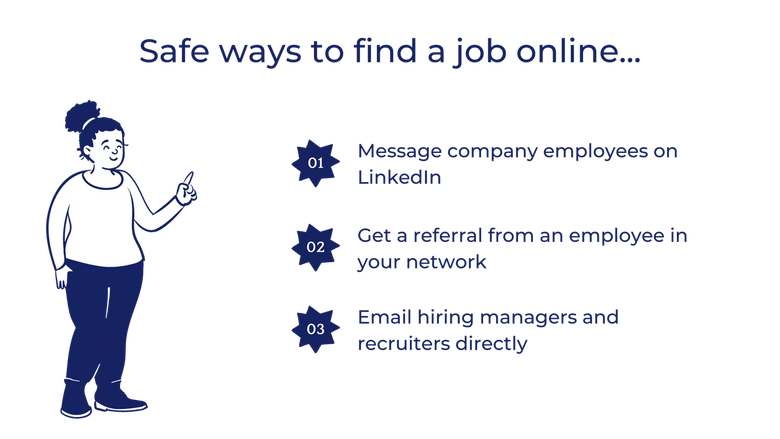Are Online Jobs Worth Applying To?
We examine scams, fake jobs, and new strategies to protect your privacy while looking for work.
Whether you’re a new grad, put out of work by the pandemic, or just looking for the next step in your career, the tech job market recruitment game can be tough to navigate.
The internet may seem like the obvious place to start, whether it’s making a Google search for “IT jobs in New York City” or looking through online job boards. Job sites like Dice and CrunchBoard even cater specifically to tech job hunters. Unfortunately, online job searching comes with its own challenges, as many openings may be expired or even non-existent.
Here’s what you need to know about fake job postings and how to avoid the trolls and land your dream tech job.
What’s the worst that could happen?

As frustrating as it is to waste your time filling out an application that no one’s going to read, there’s nothing worse than sending your personal information, complete with a cover letter, straight to a scammer.
The standard lack of transparency in the hiring process can make it easy for nefarious organizations to prey on eager job seekers. Many will go so far as to extend a job offer before asking for the candidate’s social security number or bank account information. These crimes are even easier to commit with the rise of remote work, as video interviews and virtual onboarding can make fake companies harder to detect.
One common tech job scam is when a company offers a candidate a job, but tells them that they have to cover the cost of their own background check or work training.
They might even say that the first paycheck will reimburse the initial expenses, but as you might expect, that paycheck never comes. And no, these don't just happen on Craigslist anymore: you can find scams like these everywhere, even on highly moderated job boards like LinkedIn or Angellist.
The FBI released a PSA this past January that claimed the average reported loss from fake job scams was nearly $3,000 per victim.
To avoid these scams, conduct thorough research on a company before accepting an offer.
If you can’t find much information about it, or if you find several similar-looking companies with the same name, proceed with caution. You should also be careful not to give personal information to anyone unless absolutely necessary. Most companies don’t ask for any private information until they’ve extended an offer.
Why else would a job listing be fake?

While the possibility of encountering a scammer in your job search can be scary, many non-existent postings are placed there by parties with less malicious purposes.
One possibility is an organization that wants to collect and sell applicants’ phone numbers or email addresses. Other times, whoever posted it might just want to gauge interest.
Scott Alan Miller, a former consultant and outspoken voice in IT recruitment, expresses his skepticism of most online job listings.
“The simplest reasons [for posting fake job opportunities] are simply what we call ‘fishing,’” he says. “Companies want to figure out the market price of a position or just want to see who is out there and how hard it would be to hire, so they put up a job posting just to gather information themselves.”
Similarly, a company who has no job openings at the moment but foresees needing more employees in the future may advertise a fake position in order to build a database of resumes from interested applicants. This can also give the organization a semblance of growth and success.
Aside from inconveniencing applicants, Miller speculates that postings for fake technology jobs may have a broader impact on the industry.
“It allows [companies] to make people feel like they can't find work or pass interviews so they become desperate and start asking for less money,” he says. “Industry-wide it must account for a huge loss of salary.”
So how do I find a job then?

Even without fake postings scattered across the internet, trying to find jobs through online sources can be frustrating and time consuming.
When you apply to a job online, your resume will be added to a pool of hundreds of other qualified candidates, and it can be hard to differentiate yourself enough to grab the recruiter’s attention. Your best bet at getting your next job is by going directly through an employee at the company.
You can make contact in a variety of ways, whether it’s through a friend, a mutual connection, or a recruiter. It’s also possible to get a referral from an employee you’ve never met. People often report having success requesting referrals on Blind, for example, presumably because the employee can get a bonus if the candidate is hired. There are also services like Rooftop Slushie that essentially allow users to pay for referrals to tech companies.
However, the ethics of paying for a fast-tracked hiring process can be shady, and seeking a referral from a stranger is not recommended.
James*, a software engineering intern at Facebook, found that you might have to prove yourself before an employee is willing to vouch for you. When he was looking at some internship positions at Microsoft, his dad set him up to talk to a recent hire at the company.
“After getting to know him over several different calls, I asked to get a referral and he said, ‘Well I still don’t know you,’” James recounts.
Because a candidate’s performance in the interview process can reflect on the employee who referred them, some can be hesitant to take a chance on a complete stranger.
“You can really only get referrals from people you closely know or can prove your value to. People aren’t willing to put their reputation on the line if they don’t know you,” he says.
If you don’t know anyone at the company you’re interested in, you can still make a connection by reaching out to a recruiter or a hiring manager directly.
Unlike software engineers or data scientists, a recruiter’s full-time job is to seek out and talk to prospective candidates. However, especially at a big company like Apple or Google, hiring managers’ inboxes may be flooded with emails from candidates with the same goal as you.
Rather than sending a generic request like, “Can you forward my resume to the hiring manager?” or “I would love to learn more about your company,” try to make your message stand out.
Give them your elevator pitch, do your research to ask about recent projects or initiatives within the company, and suggest several time slots to set up a conversation to convince them why you’d be a great fit. Recruiters usually only spend a maximum of two minutes on each email, so keep it concise to be respectful of their time.
*Name changed for privacy purposes
The information provided herein is for general informational purposes only and is not intended to provide tax, legal, or investment advice and should not be construed as an offer to sell, a solicitation of an offer to buy, or a recommendation of any security by Candor, its employees and affiliates, or any third-party. Any expressions of opinion or assumptions are for illustrative purposes only and are subject to change without notice. Past performance is not a guarantee of future results and the opinions presented herein should not be viewed as an indicator of future performance. Investing in securities involves risk. Loss of principal is possible.
Third-party data has been obtained from sources we believe to be reliable; however, its accuracy, completeness, or reliability cannot be guaranteed. Candor does not receive compensation to promote or discuss any particular Company; however, Candor, its employees and affiliates, and/or its clients may hold positions in securities of the Companies discussed.
